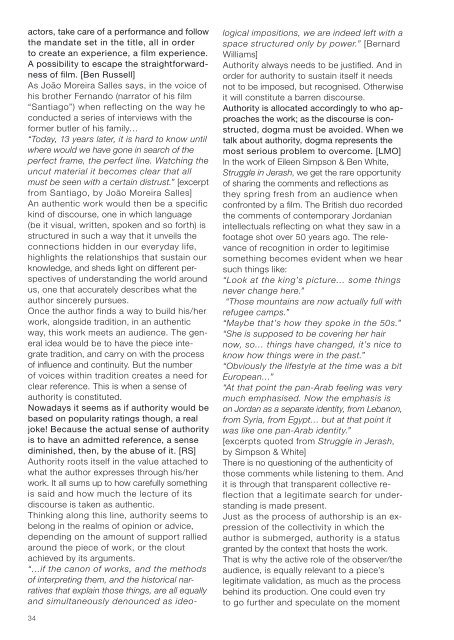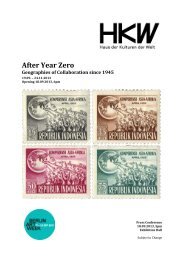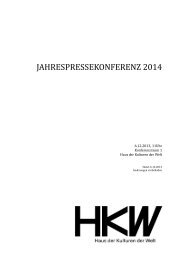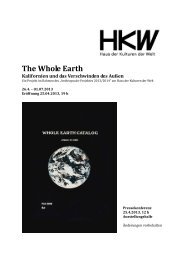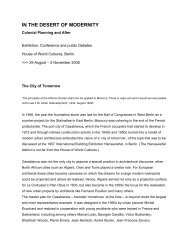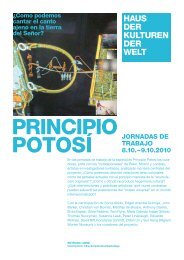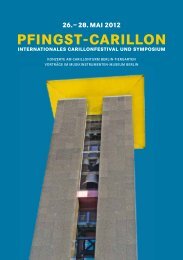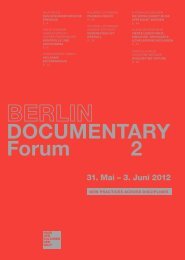DOCUMENTARY Forum 1 - Haus der Kulturen der Welt
DOCUMENTARY Forum 1 - Haus der Kulturen der Welt
DOCUMENTARY Forum 1 - Haus der Kulturen der Welt
You also want an ePaper? Increase the reach of your titles
YUMPU automatically turns print PDFs into web optimized ePapers that Google loves.
actors, take care of a performance and follow<br />
the mandate set in the title, all in or<strong>der</strong><br />
to create an experience, a film experience.<br />
A possibility to escape the straightforwardness<br />
of film. [Ben Russell]<br />
As João Moreira Salles says, in the voice of<br />
his brother Fernando (narrator of his film<br />
“Santiago”) when reflecting on the way he<br />
conducted a series of interviews with the<br />
former butler of his family…<br />
“Today, 13 years later, it is hard to know until<br />
where would we have gone in search of the<br />
perfect frame, the perfect line. Watching the<br />
uncut material it becomes clear that all<br />
must be seen with a certain distrust.” [excerpt<br />
from Santiago, by João Moreira Salles]<br />
An authentic work would then be a specific<br />
kind of discourse, one in which language<br />
(be it visual, written, spoken and so forth) is<br />
structured in such a way that it unveils the<br />
connections hidden in our everyday life,<br />
highlights the relationships that sustain our<br />
knowledge, and sheds light on different perspectives<br />
of un<strong>der</strong>standing the world around<br />
us, one that accurately describes what the<br />
author sincerely pursues.<br />
Once the author finds a way to build his/her<br />
work, alongside tradition, in an authentic<br />
way, this work meets an audience. The general<br />
idea would be to have the piece integrate<br />
tradition, and carry on with the process<br />
of influence and continuity. But the number<br />
of voices within tradition creates a need for<br />
clear reference. This is when a sense of<br />
authority is constituted.<br />
Nowadays it seems as if authority would be<br />
based on popularity ratings though, a real<br />
joke! Because the actual sense of authority<br />
is to have an admitted reference, a sense<br />
diminished, then, by the abuse of it. [RS]<br />
Authority roots itself in the value attached to<br />
what the author expresses through his/her<br />
work. It all sums up to how carefully something<br />
is said and how much the lecture of its<br />
discourse is taken as authentic.<br />
Thinking along this line, authority seems to<br />
belong in the realms of opinion or advice,<br />
depending on the amount of support rallied<br />
around the piece of work, or the clout<br />
achieved by its arguments.<br />
“…if the canon of works, and the methods<br />
of interpreting them, and the historical nar-<br />
ratives that explain those things, are all equally<br />
and simultaneously denounced as ideo-<br />
logical impositions, we are indeed left with a<br />
space structured only by power.” [Bernard<br />
Williams]<br />
Authority always needs to be justified. And in<br />
or<strong>der</strong> for authority to sustain itself it needs<br />
not to be imposed, but recognised. Otherwise<br />
it will constitute a barren discourse.<br />
Authority is allocated accordingly to who approaches<br />
the work; as the discourse is constructed,<br />
dogma must be avoided. When we<br />
talk about authority, dogma represents the<br />
most serious problem to overcome. [LMO]<br />
In the work of Eileen Simpson & Ben White,<br />
Struggle in Jerash, we get the rare opportunity<br />
of sharing the comments and reflections as<br />
they spring fresh from an audience when<br />
confronted by a film. The British duo recorded<br />
the comments of contemporary Jordanian<br />
intellectuals reflecting on what they saw in a<br />
footage shot over 50 years ago. The relevance<br />
of recognition in or<strong>der</strong> to legitimise<br />
something becomes evident when we hear<br />
such things like:<br />
“Look at the king’s picture… some things<br />
never change here.”<br />
“Those mountains are now actually full with<br />
refugee camps.”<br />
“Maybe that’s how they spoke in the 50s.”<br />
“She is supposed to be covering her hair<br />
now, so… things have changed, it’s nice to<br />
know how things were in the past.”<br />
“Obviously the lifestyle at the time was a bit<br />
European…”<br />
“At that point the pan-Arab feeling was very<br />
much emphasised. Now the emphasis is<br />
on Jordan as a separate identity, from Lebanon,<br />
from Syria, from Egypt… but at that point it<br />
was like one pan-Arab identity.”<br />
[excerpts quoted from Struggle in Jerash,<br />
by Simpson & White]<br />
There is no questioning of the authenticity of<br />
those comments while listening to them. And<br />
it is through that transparent collective reflection<br />
that a legitimate search for un<strong>der</strong>standing<br />
is made present.<br />
Just as the process of authorship is an expression<br />
of the collectivity in which the<br />
author is submerged, authority is a status<br />
granted by the context that hosts the work.<br />
That is why the active role of the observer/the<br />
audience, is equally relevant to a piece’s<br />
legitimate validation, as much as the process<br />
behind its production. One could even try<br />
to go further and speculate on the moment<br />
of observation as still being part of the<br />
making of the work, a process that comes to<br />
be when reflection occurs.<br />
Do not confuse the film for what the film<br />
shows. The experience of the film is one thing,<br />
and it is an independent experience. [BR]<br />
An important distinction between fiction and lie<br />
should be made at this point. Fiction as an<br />
inventive possibility, as a theory or model that<br />
allows for a critical reflection or artistic experience<br />
to happen, goes beyond mere falsehood<br />
or deceit. Fiction is a strategy that enables a<br />
coherent or<strong>der</strong>ing of elements to shape a discourse.<br />
Let’s consi<strong>der</strong> for example the following<br />
dialogue, enunciated by Thai non-actors<br />
playing the role of themselves in front of a<br />
camera in what sometimes escapes being<br />
read as an acted scene:<br />
- The opposition and the government... it’s like<br />
they are acting in a movie, with us as an<br />
audience. They are making a movie for us to<br />
watch. They are the villain and the hero.<br />
- What about the election commission?<br />
- The commission is just after the money.<br />
- They have no principle?<br />
- No, not at all. Only the money.<br />
- They must at least believe in something.<br />
- These people have absolutely no principles.<br />
[Dialogue quoted from Uruphong Raksasad’s<br />
Agrarian Utopia]<br />
The implications of a non-actor reflecting on<br />
the public acting of politicians raises the<br />
question of authority. Could this be an authorised<br />
voice to comment on what is being<br />
represented? In this case fiction serves sincerity<br />
and accuracy far better than any other narrative<br />
strategy. It opens a space in which an<br />
accurate and sincere approximation to a precise<br />
situation is made: a way to grant things<br />
presence.<br />
This is but one of the attributes allotted to<br />
authority: a sense of verisimilitude. To express<br />
something accurately occupies documentary<br />
filmmakers all over, as much as the<br />
concern for an artistic experience is sought.<br />
“The way I did the interviews pushed me<br />
away from him. From the start there was an<br />
ambiguity between us, one that explained<br />
Santiago being so uncomfortable. He was not<br />
just my subject, and I was not just a documentary<br />
filmmaker. During 5 days of shooting<br />
I never stopped being the son of the owner<br />
of the house, and he never ceased to be our<br />
butler.” [excerpt from Santiago, by João<br />
Moreira Salles]<br />
By taking a closer look at the power relation<br />
that unfolded during the shooting of Santiago,<br />
Moreira Salles achieves an honest position of<br />
authority through his authentic reflection on<br />
his own work. It is one where we recognise the<br />
effort made to un<strong>der</strong>stand what kind of<br />
dynamics took place, unnoticed at that moment,<br />
between subject and documentary<br />
filmmaker, butler and master, as the creative<br />
process went on.<br />
When consi<strong>der</strong>ing the creative process, authorship,<br />
authenticity and authority may lie<br />
elsewhere. Dislocated in bits and pieces all<br />
around us, in the public sphere, as part of<br />
a commonality that constitutes our unconscious<br />
as much as the acknowledged world that<br />
surrounds us. The task of seizing this continuous<br />
flow is the core of that process.<br />
A quotation serves as support, it should<br />
never be taken for the final point of a dialogue.<br />
[LMO]<br />
Authorship, Authority, Authenticity. recent documentaries<br />
from elsewhere<br />
Conversation between Eduardo Thomas, Eileen Simpson<br />
and Ben White, followed by a screening of the film<br />
Struggle In Jerash, D: Eileen Simpson and Ben White,<br />
UK 2009, 63 min, OV<br />
Thursday, June 3, 5 pm<br />
Screening of the film California Company Town, D: Lee<br />
Anne Schmitt, USA 2008, 76 min, OV, followed by a conversation<br />
between Eduardo Thomas and Lee Anne<br />
Schmitt<br />
Friday, June 4, 2 pm<br />
Screening of the film Santiago, D: João Moreira Salles, BR<br />
2007, 80 min, OmE, followed by a conversation between<br />
Eduardo Thomas and João Moreira Salles<br />
Saturday, June 5, 12 noon<br />
Conversation between Eduardo Thomas and Ben Russell,<br />
followed by a screening of the film Let Each One Go<br />
Where He May, D: Ben Russell, USA/Suriname 2009, 135<br />
min, OmE<br />
Saturday, June 5, 9.30 pm<br />
Screening of the film Agrarian Utopia, D: Uruphong<br />
Raksasad, Thailand 2009, 122 min, OmE, followed by a<br />
conversation between Eduardo Thomas and Uruphong<br />
Raksasad<br />
Sunday, June 6, 12 noon<br />
34 35


